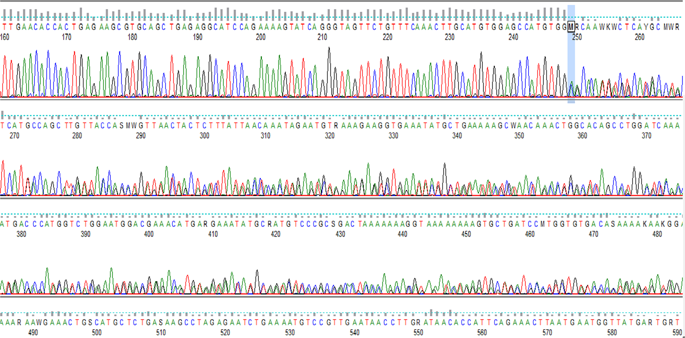当前位置:
X-MOL 学术
›
npj Genom. Med.
›
论文详情
Our official English website, www.x-mol.net, welcomes your
feedback! (Note: you will need to create a separate account there.)
Evidence for an ancient BRCA1 pathogenic variant in inherited breast cancer patients from Senegal.
npj Genomic Medicine ( IF 4.7 ) Pub Date : 2020-01-31 , DOI: 10.1038/s41525-020-0114-7 Rokhaya Ndiaye 1, 2, 3 , Jean Pascal Demba Diop 1 , Violaine Bourdon-Huguenin 4 , Ahmadou Dem 5 , Doudou Diouf 5 , Mamadou Moustapha Dieng 5 , Pape Saloum Diop 2 , Serigne Modou Kane Gueye 2 , Seydi Abdoul Ba 1 , Yacouba Dia 1 , Sidy Ka 5 , Babacar Mbengue 2 , Alassane Thiam 6 , Maguette Sylla Niang 2 , Papa Madieye Gueye 2 , Oumar Faye 1 , Philomene Lopez Sall 2 , Aynina Cisse 2 , Papa Amadou Diop 2 , Hagay Sobol 4 , Alioune Dieye 2
npj Genomic Medicine ( IF 4.7 ) Pub Date : 2020-01-31 , DOI: 10.1038/s41525-020-0114-7 Rokhaya Ndiaye 1, 2, 3 , Jean Pascal Demba Diop 1 , Violaine Bourdon-Huguenin 4 , Ahmadou Dem 5 , Doudou Diouf 5 , Mamadou Moustapha Dieng 5 , Pape Saloum Diop 2 , Serigne Modou Kane Gueye 2 , Seydi Abdoul Ba 1 , Yacouba Dia 1 , Sidy Ka 5 , Babacar Mbengue 2 , Alassane Thiam 6 , Maguette Sylla Niang 2 , Papa Madieye Gueye 2 , Oumar Faye 1 , Philomene Lopez Sall 2 , Aynina Cisse 2 , Papa Amadou Diop 2 , Hagay Sobol 4 , Alioune Dieye 2
Affiliation

|
BRCA1 and BRCA2 are the most incriminated genes in inherited breast/ovarian cancers. Several pathogenic variants of these genes conferring genetic predisposition have been described in different populations but rarely in sub-Saharan Africa. The objectives of this study were to identify pathogenic variants of the BRCA genes involved in hereditary breast cancer in Senegal and to search for a founder effect. We recruited after free informed consent, 27 unrelated index cases diagnosed with breast cancer and each having a family history. Mutation screening of the genes identified a duplication of ten nucleotides c.815_824dupAGCCATGTGG, (p.Thr276Alafs) (NM_007294.3) located in exon 11 of BRCA1 gene, in 15 index cases (allelic frequency 27.7%). The pathogenic variant has been previously reported in African Americans as a founder mutation of West African origin. Haplotypes analysis of seven microsatellites surrounding the BRCA1 gene highlights a shared haplotype encompassing ~400 kb between D17S855 and D17S1325. This haplotype was not detected in none of 15 healthy controls. Estimation of the age of the pathogenic variant suggested that it occurred ~1400 years ago. Our study identified a founder pathogenic variant of BRCA1 predisposing to breast cancer and enabled the establishment of an affordable genetic test as a mean of prevention for Senegalese women at risk.
中文翻译:

来自塞内加尔的遗传性乳腺癌患者中古代BRCA1致病变异的证据。
在遗传性乳腺癌/卵巢癌中,BRCA1和BRCA2是最关键的基因。这些基因的几种致病变异赋予了遗传易感性,已经在不同人群中进行了描述,但在撒哈拉以南非洲却很少。这项研究的目的是确定与塞内加尔遗传性乳腺癌有关的BRCA基因的致病变异,并寻找建立者的作用。在征得自由知情同意后,我们招募了27例不相关的索引病例,这些病例被诊断出患有乳腺癌,每个都有家族病史。在15个索引病例中(等位基因频率为27.7%),对基因的突变筛选确定了位于BRCA1基因第11外显子的十个核苷酸c.815_824dupAGCCATGTGG(p.Thr276Alafs)(NM_007294.3)的重复。先前已在非裔美国人中报告了这种致病性变异,是西非血统的创始人突变。围绕BRCA1基因的七个微卫星的单倍型分析突出显示了在D17S855和D17S1325之间包含约400 kb的共享单倍型。15个健康对照者均未检测到此单倍型。对病原体变体年龄的估计表明它发生在大约1400年前。我们的研究确定了BRCA1的创始人致病性变异体易患乳腺癌,并使人们能够建立起负担得起的基因检测手段,以预防处于危险中的塞内加尔妇女。对病原体变体年龄的估计表明它发生在大约1400年前。我们的研究确定了BRCA1的创始人致病性变异体易患乳腺癌,并使人们能够建立起负担得起的基因检测手段,以预防处于危险中的塞内加尔妇女。对病原体变体年龄的估计表明它发生在大约1400年前。我们的研究确定了BRCA1的创始人致病性变异体易患乳腺癌,并使人们能够建立起负担得起的基因检测手段,以预防处于危险中的塞内加尔妇女。
更新日期:2020-01-31
中文翻译:

来自塞内加尔的遗传性乳腺癌患者中古代BRCA1致病变异的证据。
在遗传性乳腺癌/卵巢癌中,BRCA1和BRCA2是最关键的基因。这些基因的几种致病变异赋予了遗传易感性,已经在不同人群中进行了描述,但在撒哈拉以南非洲却很少。这项研究的目的是确定与塞内加尔遗传性乳腺癌有关的BRCA基因的致病变异,并寻找建立者的作用。在征得自由知情同意后,我们招募了27例不相关的索引病例,这些病例被诊断出患有乳腺癌,每个都有家族病史。在15个索引病例中(等位基因频率为27.7%),对基因的突变筛选确定了位于BRCA1基因第11外显子的十个核苷酸c.815_824dupAGCCATGTGG(p.Thr276Alafs)(NM_007294.3)的重复。先前已在非裔美国人中报告了这种致病性变异,是西非血统的创始人突变。围绕BRCA1基因的七个微卫星的单倍型分析突出显示了在D17S855和D17S1325之间包含约400 kb的共享单倍型。15个健康对照者均未检测到此单倍型。对病原体变体年龄的估计表明它发生在大约1400年前。我们的研究确定了BRCA1的创始人致病性变异体易患乳腺癌,并使人们能够建立起负担得起的基因检测手段,以预防处于危险中的塞内加尔妇女。对病原体变体年龄的估计表明它发生在大约1400年前。我们的研究确定了BRCA1的创始人致病性变异体易患乳腺癌,并使人们能够建立起负担得起的基因检测手段,以预防处于危险中的塞内加尔妇女。对病原体变体年龄的估计表明它发生在大约1400年前。我们的研究确定了BRCA1的创始人致病性变异体易患乳腺癌,并使人们能够建立起负担得起的基因检测手段,以预防处于危险中的塞内加尔妇女。











































 京公网安备 11010802027423号
京公网安备 11010802027423号